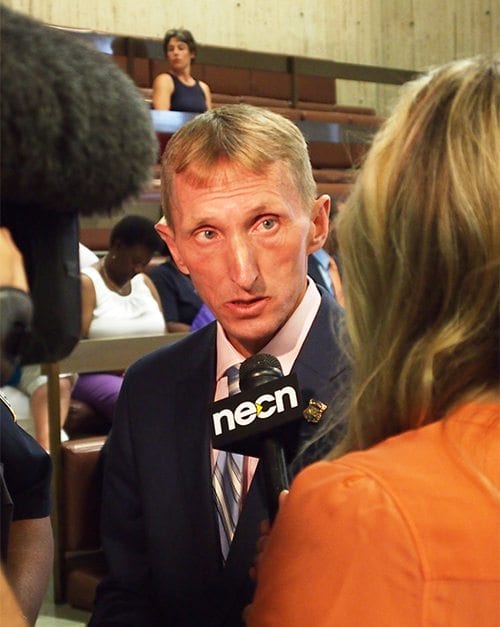
In a move that came as a surprise to some, Commissioner Evans announced last week that Boston will launch a pilot program of police body-worn cameras.
Groups such as Boston Police Camera Action Team have been calling for the devices. In August, BPCAT and Councilor Charles Yancey presented the City Council with an ordinance detailing a policy for body-camera usage, should the devices become used. Until recently, the commissioner expressed wariness.
Segun Idowu, co-founder of BPCAT, said the group was “completely stunned, in a cautiously optimistic way” when they heard the commissioner’s decision.
“I still don’t really know what to say, because for the last year they’ve been staunchly against it,” said Idowu.
What can we expect?
The cameras are only a piece of the program. At least as significant is the policy that guides their use. Evans said that he is meeting with vendors and will collaborate with the police unions and his legal staff to develop policy specifics.
“I’m working with our legal staff to look at the policies across the country. I’m working with the unions,” Evans told the Boston Globe. “So it’s coming here.”
Evans said he expects the pilot to launch within a few months.
The Boston Police Department did not respond to a request for information about the pilot program.
Policy concerns
In past body camera discussions, the commissioner has highlighted the need to answer questions around cost and privacy protections.
That officers face consequences for failing to follow procedure for proper camera use is a major concern, said Idowu. “[It] was the number one concern of every community we talked to. Everyone said, ‘If they do not have consequences I do not want this.’ ”
Idowu also said he wanted assurance that any body camera program would allow an individual to have access to recordings taken of them.
Lens on transparency
Idowu expressed concerns that if policy development remains in the hands of the police union and the commissioner’s legal staff, Evans may bypass responsiveness to the community.
“Some people might see this as they’re trying to go around the city council and establish their own will,” said Idowu. “You have BPCAT who worked with the ACLU and individual community members to come up with a policy that represented everyone’s concerns and answers to those concerns. The commissioner, and to some extent the mayor, are deciding to look past that and proceed without transparency.”
He added that openness and responsiveness in creating the body camera policy would be important to developing trust between the community and the police.
“One reason people were protesting across the country is, we don’t trust the police to police themselves.”
BPCAT continues
Now that BPCAT’s goal of body-camera implementation is coming to fruition, the organization will strive to ensure the pilot program follows procedures that answer community concerns and that the process moves quickly from pilot to full adoption, according to Idowu.
“We will work to make sure the pilot program doesn’t drag on for a year,” he said.
Next for the City
While plans develop on the pilot program, city officials also emphasized the importance of other efforts.
“Mayor Walsh and Commissioner Evans agree that body cameras for Boston police officers could be a valuable investment in our police force,” said Bonnie McGilpin, mayor’s office press secretary. “But they believe that body cameras are only one tool in police work, and do not address the fundamental problems of inequity in our communities. Mayor Walsh’s main focus is to address these inequities and to continue to build strong community relationships and enhance trust between police officers and residents.”






